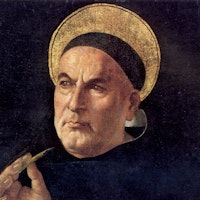If something is true, no matter who said it, it is always from the Holy Spirit.
Saint Thomas Aquinas

If Something Is True
Topic: Truth, Law, & Principle
If something is true, no matter who said it, it is always from the Holy Spirit.
Saint Thomas Aquinas (born circa 1225 in Roccasecca, Italy – died March 7, 1274, at the Abbey of Fossanova) is one of the most influential theologians and philosophers in Christian history. Born into a noble family near Naples, Thomas was educated first at the Benedictine Abbey of Monte Cassino, where his intellectual promise was recognized early. Against his family’s wishes, he later joined the Dominican Order, choosing a life of poverty, study, and preaching over the political and ecclesiastical prospects reserved for him. This decisive act of freedom and devotion marked his lifelong search for truth—a pursuit grounded in the conviction that faith and reason are harmonious paths to the same divine source.
Thomas studied under Saint Albert the Great in Cologne and Paris, where he developed a disciplined method of inquiry that sought coherence between theology and philosophy. Drawing deeply from the works of Aristotle, he reinterpreted classical thought within a Christian framework, arguing that creation’s rational order reflects the mind and goodness of God. His monumental Summa Theologica stands as a synthesis of Christian doctrine and philosophical reflection, exploring questions of existence, morality, virtue, and divine purpose. He taught that reason can guide the human mind toward understanding God’s creation, yet revelation is necessary for receiving the fullness of divine truth.
Known for his humility and serenity of mind as much as for his intellectual brilliance, Thomas approached theology as an act of worship—an offering of the intellect to God. His writings shaped the development of Western theology, ethics, natural law, and education for centuries. Canonized in 1323 and later named a Doctor of the Church, he is honored for his luminous vision of the relationship between faith and reason and for his conviction that love is the highest form of wisdom. Saint Thomas Aquinas’s legacy endures as a witness to the unity of intellect and devotion, reminding seekers that the pursuit of truth, when guided by humility and love, becomes a path toward the divine.
De Veritate
Aquinas, Thomas. Truth (Quaestiones Disputatae de Veritate). Translated by James V. McGlynn, Henry Regnery Company, 1953, q. 1, a. 8. [Thomas Aquinas, De Veritate, q. 1, a. 8.].

Saint Thomas Aquinas
Theme: Truth

About This St. Thomas Aquinas Quotation [Commentary]
Thomas Aquinas affirms truth’s divine origin when he writes, “If something is true, no matter who said it, it is always from the Holy Spirit.” He places truth above the status or identity of its speaker. What matters is not who speaks, but whether the words reflect what is real. This clarity shifts focus away from boundaries—religious, cultural, or intellectual—and toward the Spirit’s movement wherever truth appears. Thomas’s words ask for humility: a willingness to listen and to recognize that the Holy Spirit may speak through any voice.
This teaching is rooted in Thomas Aquinas’s view of the unity between faith and reason. Under the influence of Albert the Great, he came to see the study of nature as a sacred path to understanding. He writes in the Summa theologiae that “all truth irrespective of who expresses it, comes from the Holy Spirit” (1-2.109.1). For Thomas, theology and the natural sciences are not opposed; both are drawn by the same Spirit toward the same end. If something is true, its origin is divine—whether it is spoken in a scientific discovery, a philosophical insight, or a religious teaching. This conviction calls for openness across all fields of knowledge.
Thomas Aquinas’s words remain relevant in a world often shaped by division. His teaching does not lead to relativism but to a deeper reverence for what is true. To say that truth is “always from the Holy Spirit” is to trust that God’s presence is not confined to one tradition or language. It is an invitation to listen widely and carefully, recognizing that all who seek truth—whatever their path—are responding to the same Spirit. For Thomas, it is this shared desire for what is true that creates common ground between the scientist, the philosopher, and the person of faith.
Fr. Richard Rohr Commentary [Excerpts]
“I was born 75 years ago today. I know 75 is a somewhat arbitrary number, yet our culture has assigned it some significance. CAC staff encouraged me to share my journey, and they sifted through old photo albums to illustrate my very human path. So today I offer a few reflections from my own “particular” life. I hope you, too, can see in your life your own unique manifestation of the image and likeness of God, each of us “crying what I do is me: for that I came” in Gerard Manley Hopkins’ words. …
This one Holy Spirit has moved through all of us over time—creating the Franciscans and the Second Vatican Council for Catholics, the Baptism in the Spirit for many Protestants, deep mystical movements in all faith traditions, and a growing recognition, as St. Thomas Aquinas often wrote, “If something is true, no matter who said it, it is always from the Holy Spirit.” In time, I could not help but see the many faces of Christ and the Spirit in serene Hindus, native peoples in love with the natural world, my socially conscious Jewish friends, profound Buddhist wisdom, Sufi God-lovers, and, of course, in loving Catholics, Orthodox, and Protestants of every stripe, often in spite of their denomination or theology rather than because of it.”
―St. Thomas Aquinas often wrote, “If something is true, no matter who said it, it is always from the Holy Spirit.”
BY Mvenner, March 31, 2018.
* Thomas Aquinas, De Veritate, q. 1, a. 8. The statement “Omne verum, a quocumque dicatur, a Spiritu Sancto est” was used repeatedly by Aquinas; he gave credit for it to Ambrose, an earlier Doctor of the Church.
Fr. Billy Swan Commentary, The Truth of Things
Here I argue that the thought of St. Thomas is again required by the Church to dialogue confidently with modern science [one of three reasons why]…
Thomas invites us to love both the natural sciences and the science of faith. Under the influence of St. Albert the Great (c. 1200-1280), Thomas appreciated the scientific study of creation as an enterprise of observation, discovery, and contemplation of all that God had made. He saw a harmony between science and faith, since, for Thomas, it is truth that unites both faith and the natural sciences. He wrote that “all truth irrespective of who expresses it, comes from the Holy Spirit” (Summa theologiae, 1-2.109.1). This means that for both the believer and the scientist, what unites them is a passion for what is true.
What also unites them is a disdain for relativism. The implications of this insight for us today is that we should not be afraid to dialogue with science—to know its power and its limits. When I worked in science, the study of physics, chemistry, and biology were not threats to my faith but routes to contemplation of all God’s handiwork, which moved me to praise him even more.
―Fr. Billy Swan, St. Thomas Aquinas and Our Dialogue with Modern Science, January 28, 2021.
Resources
Related Quotes
Copyright © 2017 – 2026 LuminaryQuotes.com About Us